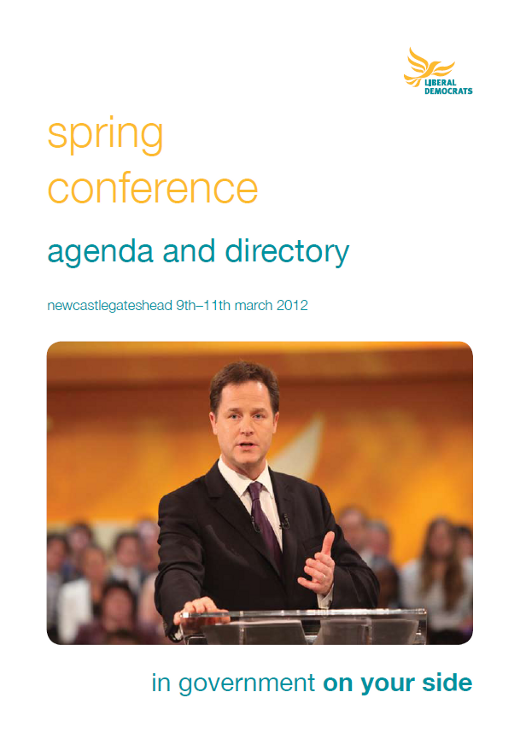Expect lively debate on the NHS at Lib Dem spring conference
 The 2011 Liberal Democrat spring conference was marked by the sort of intensive policing, extensive barriers and crowds of angry protesters that have long been the norm at other party conferences.
The 2011 Liberal Democrat spring conference was marked by the sort of intensive policing, extensive barriers and crowds of angry protesters that have long been the norm at other party conferences.
For many Liberal Democrat conference representatives the sight of the angry protesters was rather bizarre. Not that they should have turned up – the party was now in government after all – but rather that the angrier the protesters, the earlier they knocked off each day to go home. The most angry were so brief in their part-time appearances as to give genuine part-timers a bad name, while the more traditional few who stay for hour after hour, coming back the next day, were the least angry.
The real action, however, was inside the conference hall where the NHS Bill debate made a pause in its parliamentary process essential and resulted in several major changes to the plans for the NHS.
One year on, those concessions have somewhat lost their shine as the legislation is still surrounded by controversy, with most of the official NHS staff bodies opposing it (even though 50 foundation hospitals recently wrote to back it). Add to that the debates over the Welfare Reform Bill and in particular the questions of capping benefits and the Employment and Support Allowance (ESA), and you might expect a lively, contentious conference.
Except… neither of these issues are on the Lib Dem spring conference agenda, which has had to be drawn up before the outcome of key parliamentary debates is known. There is a slot for emergency and topical issues to cover this eventuality, but with only time for one motion, not all of the controversies can be aired. Unless a procedural trick is pulled or events change markedly, I expect that an NHS motion will win out in the ballot of conference representatives for that slot as the people behind it have the bigger, more organised network to mobilise the vote.
It does all mean that the normally rather quiet sessions of questions to the parliamentary parties and party committees will be livelier than normal, even though the former is at 9am on the Sunday morning. Journalists will be wise to go light on the alcohol and pack an extra alarm clock.
Another normally quiet spot is that for changes to the party’s rule book (so quiet at the last conference that I managed to get one change through by dint of being the only speaker). This time there are proposed changes to the party’s so-called “triple lock”, which procedural experts know in fact contains four steps and governs how the party should go about making decision on going into coalition in a hung Parliament.
Although seen to have generally worked well in May 2010, it was not a perfect mechanism for party democracy and an update version to account for those lessons and a ruling of the party’s Federal Appeals Panel is being presented to conference.
Superficially the proposals retain the key elements of party consultation culminating with a vote at a special conference before the leader can take the party into coalition. However, all is not quite as it seems – as evidenced by a rather mild comment from myself about it a few days ago resulting in an amusing mini-blizzard of communications from party officials and staffers to me, offering to talk about it. All just to provide helpful background, you understand.
The proposal expands the number of people to be consulted or involved in future hung Parliament negotiations, but removes the possibility of balloting all party members, removes the Federal Executive’s veto and reduces the size of majorities required.
The case for the change is that if you involve more people it becomes impractical to have all of them retain the same sorts of vetoes as under the old system, and there is still a binding vote at party conference. The case against is two-fold – first, that it is removing or weakening several parts of the lock and, second, in so doing may also undermine the hand of party negotiators. The more steps they can honestly say they have to get their party to agree to, the stronger their position when arguing, “Look, we really need just one more concession if we’re going to get this through…”.
A two-thirds majority is needed for the change, making it potentially a close vote if there are strong speeches made against the change.
Many other motions repeat existing party policy or extended it in line with recent public statements. One that is of more importance is the motion on taxation, which lays out clear – if rather modest – Liberal Democrat plans for wealth taxation. The choice of which wealth taxes to support has been a matter of some controversy in the party, and this motion gives a chance to settle that with a proposal for a 1% annual levy on the value of a property that exceeds £2m. The motion rather anxiously proclaims that this would only hit 0.1% of people. It would hit rather more headlines however and would stake out a clearly different approach from that of Conservatives.
All in all, plenty of political material for party members, bloggers and journalists to get their teeth stuck in to.
Leave a Reply